Scenes of the Battle Field — Personal Adventures at the Battle of Bull Run
From The Boston, Traveller, Aug. 1.
Mr. Edward S. Barrett, of Concord, has, at our request, furnished us the following narrative of his experience on the day of the recent Battle of Bull Run. It will be found exceedingly interesting: and our readers will agree that if all the “civilians” who went to the field on that day had behaved as well as Mr. Barrett, there would be no reason to complain of them.
It is quite possible that the writer has in some cases used the wrong military terms, for he makes no pretension to military knowledge; but his narrative will be found in all important particulars as authentic as it is interesting. It commences with the night before the battle:
On Saturday evening, the 20th of July, I heard we were to start at half past two the following morning, and our line was to be in readiness at an early hour. We had occupied the camp at Centreville since Thursday night. Wrapping my blanket around me, at 10 o’clk I stretched myself upon the bare ground to sleep. The night was cool, and at 12 o’clock I awoke feeling very cold, and unable to sleep more, I anxiously waited to hear the signal to prepare. At two o’clock our drum sounded through the camp, and was repeated through the numerous camps around us, and in half an hour forty thousand men stood ready to battle for the Union.
The Fifth Massachusetts regiment, which I accompanied, was in the division under Heintzelman, acting Major General, and our regiment was the third in the column. The First Minnesota, under Colonel Gorman, led forward by the Massachusetts Eleventh, Colonel Clarke; then the Fifth, Colonel Lawrence, with the regular cavalry and a battery of artillery leading the advance. We waited, in marching order, from half past two o’clock till after six before the order was given to advance, and then we learned that Colonel Hunter, with eight regiments, including Governor Sprague’s command had preceded us, and we were to follow. General McDowell and staff heading our division.
Mounted on a secession horse, which I had captured two days previously, I followed in rear of the regiment, in company with Quartermaster Billings and Surgeon Hurd. From Centreville we took the extreme northern road, leaving the Warrentown road on our left, which General Tyler had taken with his division. Passing through a forest of heavy oak timber some three miles in length, we emerged into the open country, with a wide interval on our left, and the Blue Ridge Mountains distinctly visible on our right. We had heard and occasional cannon shot during the morning, but not until ten o’clock was there any sound of a general engagement. The heavy cannonading on our left and in front caused the march to be hastened, and our men could hardly be restrained, so eager were they for the fight. About a mile and a half before we reached the field the men began to throw away their blankets, haversacks and all unnecessary appendages, the different regiments trying to throw them into a pile, or as near together without halting. I tied my horse near the hospital headquarters, and hastened to the head of the column, which advanced in double quick time till they cam within reach of the enemy’s guns. The fight was raging on our left and in front as our division came into the field. I could see that the enemies batteries were posted on a long ridge, with woods extending on either flank, and separated from us by a valley. It was now about half past eleven o’clock. General McDowell ordered one brigade, under Colonel Franklin, consisting of the First Minnesota, Eleventh and Fifth Massachusetts and a Pennsylvania regiment, to advance down the hill and take a position in the valley on a slight elevation directly in front of the rebel batteries. I followed on some distance, but the shot rattled about me, and I halted near General McDowell and staff, while the brigade swept past me and down the hill. I watched for some time the colors of the fifth with intense interest. The regiment reached the valley and deployed to the right on to a slight knoll, fell flat on their faces, while the shot from the rebel batteries passed mostly over their heads. A battery swept past me to take a position. I followed it along some distance, when the Major galloped back to me and called out: “Friend, tell Captain F. to hurry up my supports.” I did not know Captain F., but hastened back and met an orderly, of whom I enquired who he was. He pointed him out to me near a regiment of infantry. I rushed up to him and gave my message. He replied, “They are coming right along.” And on double quick the regiment followed after the battery. The rifle cannon shot, shells and bullets struck all around me, and men were falling in every direction. Seeing a high persimmon tree standing alone, a short distance down the hill, I determined to climb it. The top of it was dead, and about thirty feet off the ground. From this elevation I had an unobstructed view of the whole line, and I could see into the enemy’s entrenchments, where the men looked like so many bees in a hive, and I could plainly see their officers riding about, and their different columns moving hither and thither. Their batteries on the right and left were masked with trees so completely, that I could not distinguish them except by the flash from their guns,; and a battery in a cornfield on our extreme left was so completely concealed by the cornstalks placed so naturally about it, that our men came suddenly upon it, never dreaming of one so near. The cannon ball struck the ground continually close to the tree and bounded along for a quarter of a mile to the rear. I felt that I was above the range of these, but the rifle balls whistled about my head, striking the tree in a way anything but pleasant. Just after I had reached the top of the tree a New Hampshire regiment, close at my left had succeeded in driving them from the woods in front, and, with three cheers, they fell back into line.
When the line was formed, three cheers were given for Colonel Marston, who had fought gallantly and received two severe wounds. Sherman’s battery then commenced firing on my right, within thirty rods of me, and at the first discharge the men cheered and watched the effect of the shell, which exploded inside the enemy’s entrenchments. The men cheered again, to see that they got the range so quickly, and continued to fire with great rapidity, while the enemy returned the fire with equal vigor and precision, the cannonading being kept up incessantly for an hour.
The shot and shell from this battery must have done the rebels great damage, as every shot took effect within their intrenchments. – Still men and horses kept falling near our guns, and the infantry lines were parted in many places by their cannon balls. The valley for nearly one-half mile in front of the enemy’s works was filled with our infantry, extending to some patches of woods on our right. Our batteries were placed on various eminences on the flank and rear, shifting their positions from time to time. The fire from our lines in this valley was terrific, and as they kept slowly advancing, firing, retreating to load, and then advancing again, it was a sight which no words could describe. For three long hours we poured into their intrenchments this terrible fire, and whenever the enemy showed themselves on the flanks they were driven back with great slaughter. During all this time our men were subjected to a cross fire from the enemy’s infantry stationed in the woods on our left. At one time the “Stars and stripes” were waved in these woods, and men dressed much like our own called out not to fire that way. Our men gradually drew up towards the flag, when immediately the secession flag was thrown out and the rebels poured a volley into our men so unexpectedly that they were for the time driven back, but we soon regained the ground.
General McDowell now ordered a battery forward to take a position near a house on our right; the Fire Zouaves were ordered to support it. The position appeared to me, from my lookout, like a strong one, as it was on a hill on a level with the rebel batteries. – Our battery started, the horses running at the top of their speed, and shortly began to ascend the eminence, the Zouaves following closely; but scarcely had the battery halted and fired, before the enemy opened upon them from new masked batteries, and a terrific fire of musketry from the woods, and our artillery was driven back, many of their men and horses being killed. The Zouaves stood their ground manfully, firing in lines and then falling on their faces to load. The ranks we becoming dreadfully thinned, yet they would not yield an inch; when suddenly our dashed the Black Horse Cavalry, and charged furiously, with uplifted sabres, upon them. – The Zouaves gallantly resisted this furious onset without flinching, and after firing their muskets – too sorely pressed to load – would fight furiously with the bayonets or any weapon they could seize, and in some instances drag the riders from their saddles, stabbing them with their knives, and mounting their splendid black horses gallop over the field. Never, since the famous charge of the Light Brigade, was a cavalry corps more cut to pieces. There is a bitter animosity existing between the Black Horse Cavalry and Ellsworth’s Zouaves. A great many of the cavalry are citizens of Alexandria and Fairfax county and they resolved to kill every Zouave they could lay their hands upon to avenge the death of Jackson, and the Zouaves were equally determined to avenge the murder of Ellsworth; so no quarter was expected by them.
I had now been in the tree some two hours, and all this time a continuous stream of wounded were being carried to the rear. The soldiers would cross their muskets, placing their wounded companion across; slowly carry them past; and another soldier would have a wounded man with his arm around his neck, slowly walking back, and then two men would be bearing a mortally wounded comrade in their arms, who was in convulsions and writhing in his last agonies.
Leaving the tree, I went along over the field to the left, the bullets whistling about me and the cannon balls ploughing up the ground in every direction, when I came across two of our men with a prisoner, who said he belonged to a South Carolina regiment. I asked him some questions, but he was dogged and silent, and did not appear to be disposed to reply to my inquiries. The shot fell so thick, and shells bursting around me, I hardly knew which way to turn. A musket ball whizzed past my ear so near that I felt the heat, and for a moment thought I was hit. – The ground was strewn with broken guns, swords, cartridge boxes, gun carriages, haversacks together, with all the paraphernalia of warfare, mingled with the dead and wounded men. I saw here a horse and his rider under him, both killed by the same cannon ball. Seeing a small white house still towards the left, with a well near it, I started for some water, and getting over a wall I discovered lying beside it a number of our dead with their haversacks drawn over their faces. I lifted the cover from their faces, thinking, perhaps, I might come across some of my friends, but they were all strangers, or so disfigured that I could not recognize them. I went to the well for a drink, and as I drew near the house I heard loud groans, and such a scene as was there presented, in that little house of two rooms, and on the grass around it, was enough to appal the stoutest heart.
The rooms were crowded, and I could not get in; but all round on the grass were men mortally wounded. I should think there were at least forty on that green sward, within 20 rods of the house, and such wounds – some with both legs shot off; some with both legs broken; others with horrid flesh wounds made with shells. I saw one man with a sound in his back large enough to put in my fist; he was fast bleeding to death. As I walked among them some beseeched me to kill them and put an end to their agony; some were calling for the surgeon, but the hospital was more than a mile off, and there were but two surgeons there; some were just gasping, and some had died.
I left the house and bore off towards the right towards some low pine woods, about a hundred yards distant, and scattered along were the dear bodies of our men. On reaching the wood I found ground literally covered with the dead bodies of the enemy, and I counted in the space of ten rods square forty-seven dead rebels and ten mortally wounded; and scattered all through the woods still farther back were any number more. I talked with several of the wounded, and they told me they belonged to the 8th Georgia regiment, Col. Bartow, and had arrived at Manasas from Winchester the day before, where they had been with Gen. Johnston. They told me their whole regiment was posted in this pine woods. One young man told me he was from Macon, and that his father was a merchant. I asked another where he was from; he replied defiantly, “I am for disunion – opposed to you.” This man had both thighs broken.
I heard one of our soldiers ask a wounded Georgian if their orders were to kill our wounded. He answered No. Our soldiers carried water to these wounded men, and as they lay writing in agony a cup of water was put within their reach. The convulsions of one of these men was awful to look upon; he appeared to have been shot in the lungs, as he vomited blood in large quantities, and in his struggles for breath would throw himself clear from the ground. I noticed among the heaps of bodies an officer dressed in light blue uniform, with green stripes on his pants, a fine looking man, whom I took to be a captain. I also saw one of our soldiers take sixty dollars from the body of a dead Georgian; and their knives, revolvers, &c., were appropriated the same way. This I looked upon as legitimate plunder for the soldiers, but as a citizen I forebore to take anything from the field.
I think the fight in this wood must have been fiercer than in any part of the field, except it may be on our right, where the Zouaves were. The wood was near the enemy’s right, and where the fight commenced in the morning with Hunter’s division, and as Heintzelman’s division came into action the rebels were giving way at this point, under the galling fire of Co. Marston’s regiment, while the Rhode Island troops and some New York regiments had driven back their extreme right. – Passing through these pine woods I still bore to the right towards our centre, and crossed a cleared space and came to some heavy wood, on the edge of which I perceived a number of dead scattered about; and seeing several wounded men, I went up to one of them, and found he was a rebel belonging to an Alabama regiment. He told me he joined the regiment on the 13th of April. He pointed to a dead horse close to us, and said, “There is my Colonel’s horse, and I suppose you have taken him prisoner.”
[Concluded to-morrow.]
Part 2
New London (CT) Chronicle, 8/6/1861
Clipping Image
Edward S. Barrett* bio
Edward S. Barrett* at Ancestry.com
Barrett, Edwin Shepard What I Saw at Bull Run
Contributed by John Hennessy
*Likely the letter writer
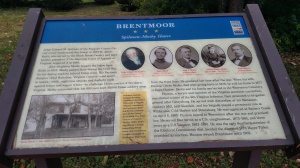
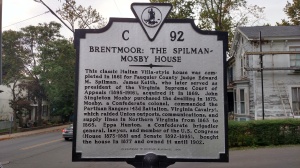
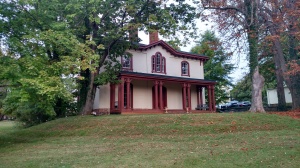
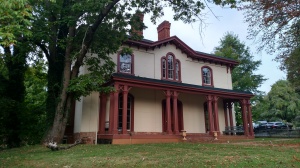

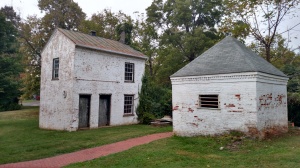
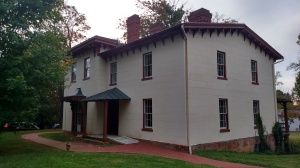
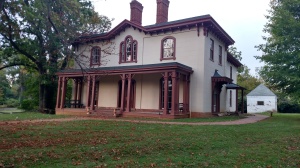

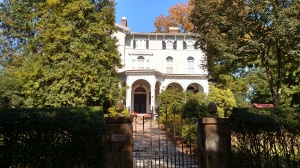

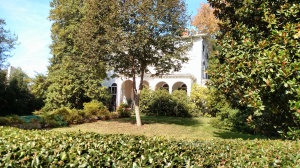
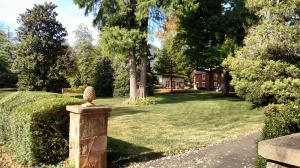
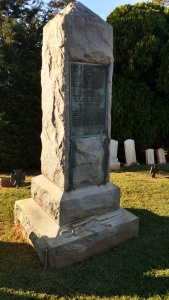
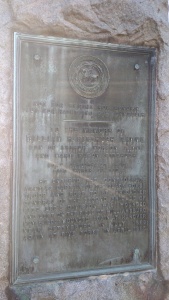



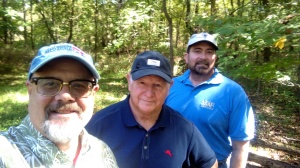
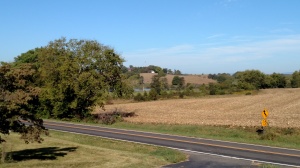
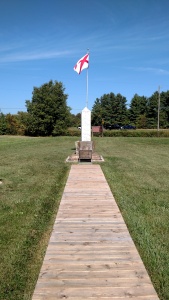
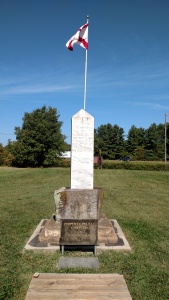


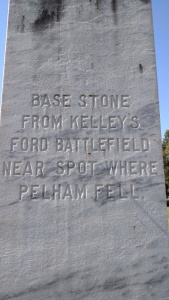
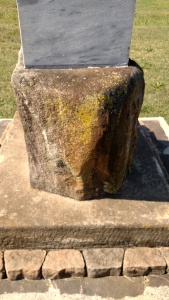

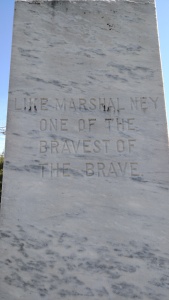
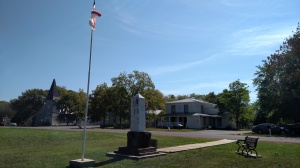
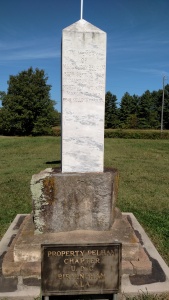
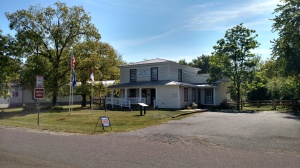
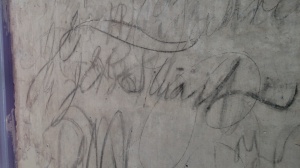

Recent Comments